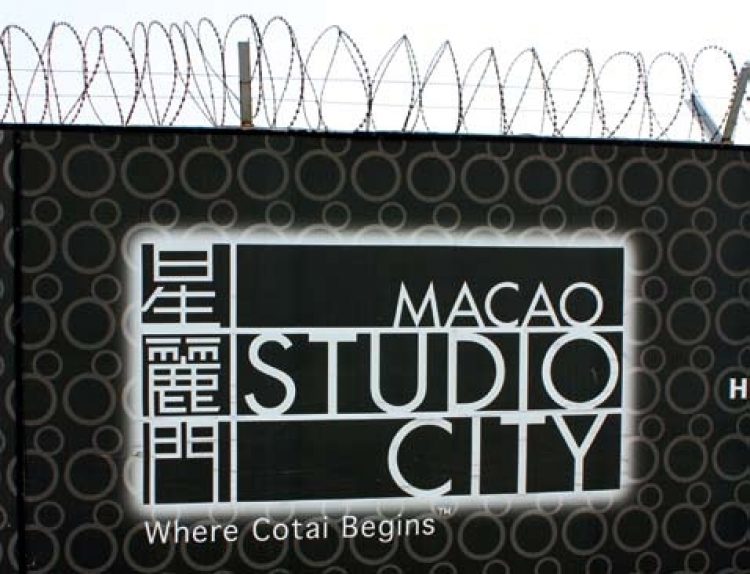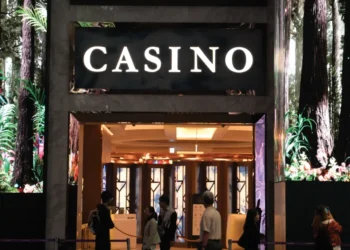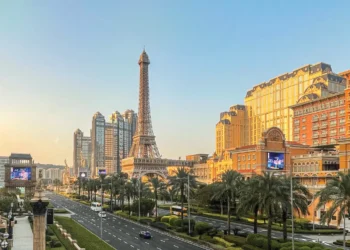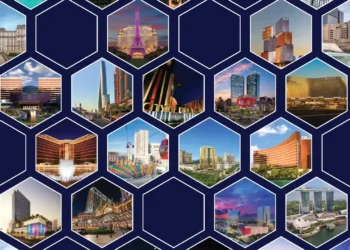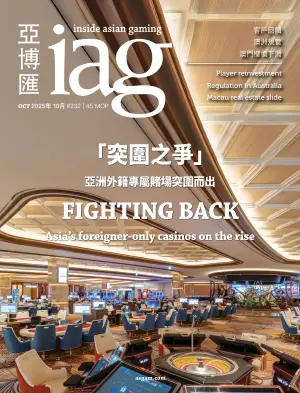Macao Studio City could still be allowed a casino—whatever the territory’s land development blueprint may say
While it’s correct that the Macao Studio City site was never gazetted for gaming under Macau’s 2008 development plan, this doesn’t exclude the possibility of a casino being allowed on the site, Inside Asian Gaming has been told.
“The mistake people are making is to assume that gazetting under the land use plan is the only route to getting a casino. That’s not the case,” a source familiar with Macau planning procedures told IAG.
“Land can be used for gaming if a letter of authorisation to that effect is obtained from the DICJ [Macau’s gaming regulator]. My understanding is such a letter of authorisation from the DICJ has been granted to the Macao Studio City project some time ago,” adds the source.
Article 46 of the License Contract of Macao Special Administrative Region for the Operation of Games of Fortune or Chance or Other Casino Games appears to give the Macau government—i.e. the Chief Executive and Executive Council— discretion on whether land is licensed for gaming use.
It states: “1. The licensing rules, especially the rules of licensing land for the use by the Concessionaire to engage in the licensed services, shall be specified in relevant land license contracts.
“2. The land license contract concluded between the Government and the Concessionaire shall be governed by the applicable provisions of this License Contract.”
In other words, the land licensing rules will follow a legal framework, but policy as to who gets the land will be decided by the Government.
IAG’s source adds: “There are several precedents within the Macau market of properties being allowed to offer gaming while sitting on non-gaming gazetted land.”
One of the most famous examples is Galaxy StarWorld, built on the edge of a reclamation area on Macau peninsula known as NAPE. The site on which StarWorld sits was originally gazetted in 1992 for a hotel and retail complex a maximum 19 storeys high. The land lease was for 25 years. The reason for the height restriction was because in the 1990s the Portuguese administration conceived NAPE as a medium-rise, modest density zone with significant amounts of public open space. But in 2003, Macau’s first Chief Executive Edmund Ho used his executive powers to grant Galaxy the right to build a 33-storey casino hotel on the site—ignoring the previous zoning and exceeding the old height restriction by a whopping 14 storeys.
Taken in that context, the remarks of Lau Si Io, Macau’s Secretary for Transport and Public Works, made to the media recently about Macao Studio City look less categorical now than they seemed at the time. Some commentators had assumed Mr Lau was sending a message to the market when he said that a casino was not mentioned for Macao Studio City under the 2008 development plan and that the plan—currently for hotels and a film studio facility—must be adhered to as it stands. Those commentators took this to be a sign that the MSC plan to construct a casino resort there by the revised date of 2015 was somehow in political trouble and that this was a snub to Lawrence Ho, the co-Chairman of Melco Crown Entertainment. MPEL recently took a 60% equity stake in the project.
According to IAG’s sources, that may be a significant overstatement of the position. They believe the reason the re-gazetting of the 32.3-acre plot—on Cotai next door to the Lotus Bridge crossing point into mainland China—never took place was not because the government opposed it, but because of practical planning considerations on the MSC side among the shareholders at that time. Submission of and approval for regazetting of the Macao Studio City site for gaming would have triggered two things. First, a requirement to pay an additional land premium to reflect that new permission. Second, it would have started the development countdown. That’s a protocol whereby a developer has to pass certain construction milestones in a certain amount of time. But the shareholders in the project at that time were not in a position to trigger the development countdown because several were involved in an internal dispute. The cut off point for development of the site—at which time MSC could theoretically have lost the land—was originally 2013.
If gaming is now to be officially confirmed for the MSC site, then an additional land premium will have to be paid to reflect that permission. But MPEL and its partners in the MSC project will be wary of making public pronouncements on the land use issue until they have the clear and unequivocal public blessing of Macau’s Chief Executive for a gaming resort. They will be mindful of some of the political problems encountered by Las Vegas Sands Corp. On several occasions, that company thought it had reached a private understanding with the Macau government and then made what turned out to be premature public announcements—including a claim that it had resolved the Cotai land title issue affecting the proposed sale of apartments in the Four Seasons Macao.
“Investors aren’t going to write cheques for Macao Studio City unless there’s some assurance from the government that there’s permission for gaming. There has to be at least some oral assurance from the government that gaming will be allowed on that land,” said the person familiar with planning procedures.
Even if that worst case scenario came to pass, and a casino wasn’t allowed on the MSC site, it’s unlikely that any other leisure project on that kind of scale would be viable on that site without the cash flow provided by gaming.
Caution—elephant in the room
The Macau government’s willingness to manage the market at a micro level leaves some question marks surrounding Macao Studio City
Another source says a bigger potential threat to the Macao Studio City project than the land use question is the table cap issue. The current market cap of 5,500 live tables is due to expire at the end of 2013, before the revamped MSC project will be completed. But if Macao Studio City is to go to the markets for fresh equity and some debt funding, as Lawrence Ho indicated in a press conference recently, then investors may want assurances that MSC will be able to get all the gaming tables it needs to make the financial structure of the project viable.
“In order to get this project up and running, we are going to go to the debt markets again, and there’s going to be further equity that will be required of both Melco Crown and also New Cotai—Silver Point and Oaktree,” Mr Ho told the press conference at City of Dreams following the news of MPEL’s 60% equity stake in the project.
“For financing purposes, we will look to Macao Studio City—the project company—to go and try to get debt and bank financing and we certainly hope that we can get non-recourse financing for the MSC project,” he stated.
Mr Ho added he envisaged MSC would have 400 gaming tables and 1,200 slot machines. But sources spoken to by IAG say it might be difficult for Western banks to sign up to MSC without specific government guarantees on the size of the gaming component.
“Is the government going to give investors a sheet of paper guaranteeing the project the tables they need and that there won’t be a fresh table cap between now and 2015? I don’t see that happening,” says one source.
“In that case, it could push the US banks out of the picture. Then you’d be looking at just Chinese banks to fund it. That’s feasible of course, but it would be the first time it’s happened on Cotai.”
The number of tables in the Macau market stood at 4,853 at the end of the first quarter, according to DICJ statistics. The opening of Galaxy Macau added another 450 tables, taking the market tally to 5,303. Sands China acting CEO Michael Leven told an earnings conference call late last year that the Macau government had indicated it would be allowed at least 400 tables at its Cotai 5 and 6 sites. If Cotai 5 and 6 were to open in full before the end of 2013, that would push the market beyond the current table cap limit.
The table cap principle is probably more a rule of thumb than an absolute ceiling. But it was a shock to the market and to investors when it was announced in early 2010 and did create some nervousness about the trajectory of Macau. It was a clear sign that the Macau government wasn’t simply willing to leave things to the market—as some investors may have hoped—and would intervene at a micro level if it felt there was a social and political need to do so. And with at least three other new gaming projects mooted for Cotai in the next five years—aside from Macao Studio City and Sands China’s Cotai 5 and 6—then further imposition of table caps can’t be ruled out.
Hard Road
Macao Studio City has had a long gestation—now investors hope for an easier birth
Macao Studio City was first conceived as a US$2 billion project with an opening date in 2009. Under the revamped plan, that opening date is now likely to be 2015.
The original partners in the project were brought together by David Friedman, a former senior executive of Las Vegas Sands Corp who played a key role in the development of The Venetian Macao. The original structure of the partnership was complex. That seems to have been a contributory factor in creating difficulties that ultimately led to litigation between Hong Kong-listed eSun Holdings, a conglomerate specialising in entertainment, and New Cotai LLC, a consortium owning 40% of the project and including Mr Friedman and US-based hedge funds Silver Point Capital and Oaktree Capital Management. The first public sign of disagreement was the global financial crisis of late 2008, when eSun faced liquidity issues and indicated it wanted out of the project—but could not agree with the other partners on the valuation of its stake.
In June this year, action in the Hong Kong courts between eSun and New Cotai was dropped after MPEL—under whose gaming licence any casino at MSC would operate—came in and brokered a deal. MPEL agreed to pay eSun US$260 million for its stake in Macao Studio City, and agreed to pay the remaining partners in New Cotai LLC a total of US$100 million over three years. In return, MPEL receives a 60% equity stake in the project. Two of the original partners—eSun and Singapore’s CapitaLand (with whom New Cotai was not in dispute) are now completely out of the project. That leaves a much cleaner structure, with MPEL on 60% and New Cotai on 40%.
Although the revived project will be constrained to some extent by the foundation work already put in, Mr Ho stressed last month that the MSC scheme would undergo a redesign and he anticipated it would cost US$1.7 billion to complete—on the face of it making it a US$1.8 billion project in total when the foundation work is factored in.






